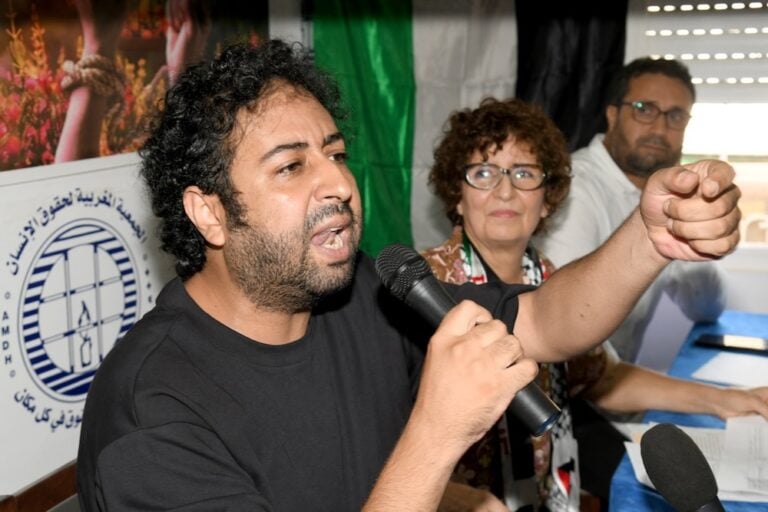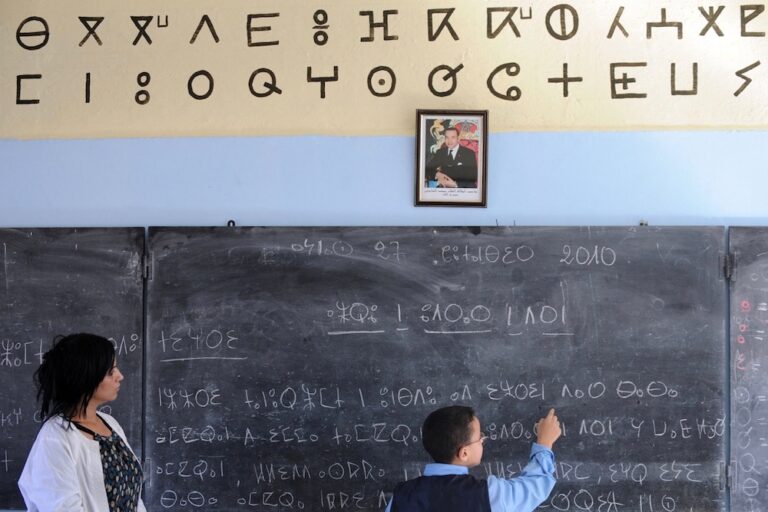(RSF/IFEX) – RSF is concerned about recent pressure by the Moroccan authorities on a Moroccan publication and the Spanish press in Morocco. “The charges weighing against ‘Demain Magazine’ are ridiculous. It is clear that the Moroccan authorities are seeking to quiet once and for all one of the rare newspapers that tries to inform freely. […]
(RSF/IFEX) – RSF is concerned about recent pressure by the Moroccan authorities on a Moroccan publication and the Spanish press in Morocco. “The charges weighing against ‘Demain Magazine’ are ridiculous. It is clear that the Moroccan authorities are seeking to quiet once and for all one of the rare newspapers that tries to inform freely. Moreover, why should Spanish journalists have to suffer because of a diplomatic crisis between Morocco and Spain?” asked RSF Secretary-General Robert Ménard. “We ask King Mohammed VI to see to it that media are able to exercise their role freely,” he added.
On 7 November 2001, Ali Lmrabet, publication director of the weekly “Demain Magazine”, will appear before a Rabat tribunal for “distribution of false information undermining or likely to undermine public order.” An article published in the 20 October edition of “Demain Magazine”, titled “The Skhirat Palace is reportedly for sale”, was described by the Rabat first instance prosecutor as a “fabric of false information and totally false allegations.” Lmrabet believes that the real reason for the charges is the publication (in the newspaper’s 27 October edition) of excerpts from Jean-Pierre Tuquoi’s most recent book about Morocco, titled “The Last King”, as well as his articles about Moulay Hicham, the king’s cousin. According to Lmrabet’s lawyer Ahmed Benjelloun, the journalist is being prosecuted in accordance with Article 42 of the Moroccan Press Code, which provides for a prison term of two to five years. In December 2000, Lmrabet’s weekly “Demain” was banned with two other publications, “Le Journal” and “Assahifa”, for “threatening the state’s stability” (see IFEX alerts of 11 January 2001 and 4 December 2000). In January, the newspaper began publishing anew under the name “Demain Magazine”.
Furthermore, in anticipation of King Mohammed VI’s trip to the Western Sahara, Spanish press representatives have had difficulty receiving authorisations to cover the trip. On the morning of 30 October, Javier Espinosa, a Morocco-based correspondent from the Spanish daily “El Mundo”, was expelled from the city of El Aïoun (in Western Sahara) to Casablanca. The previous evening, plainclothes police officers went to his hotel room and asked him to leave the city, under the pretext that he did not have the authorisation to stay there. Yet, in principle, the journalist, who is accredited with the Ministry of Communications, is authorised to cover events throughout the country.
That same day, Fernando Linares, director of the Spanish EFE news agency’s Rabat bureau, noticed that his name did not appear on the list of journalists who were authorised to cover the king’s trip. When he sought an explanation, Chakib Laâroussi, who oversees the foreign press at the Ministry of Communications, responded that the Spanish press was unwelcome in the Sahara and that his presence there was “the Moroccan authorities’ last priority.”
Carla Fibla, correspondent for the Spanish radio station SER and the Spanish daily “La Vanguardia”, also asked Laâroussi why she was barred from covering the trip. On 30 October, he suggested she “follow the royal visit on television.”
Finally, on 31 October, other Moroccan authorities informed Spanish media representatives that they could cover the king’s trip after all.
These measures came a day after the Moroccan authorities’ decision to recall the country’s ambassador from Spain. According to the 30 October edition of the daily “El País”, one of the reasons for the ambassador’s recall was reportedly “an EFE dispatch about a Rabat publication’s legal problems” (“Demain Magazine”).


